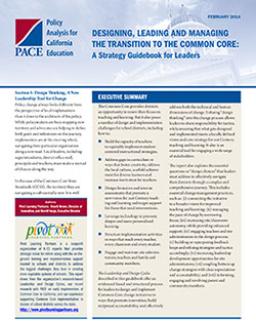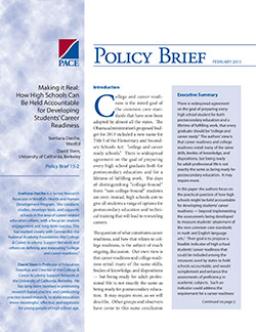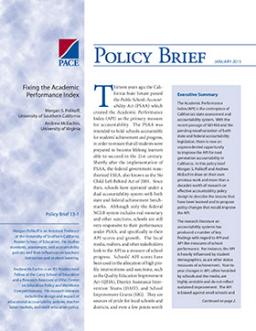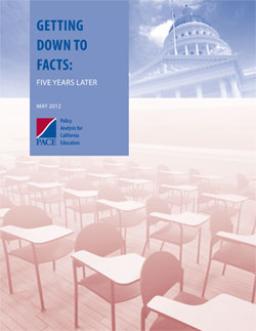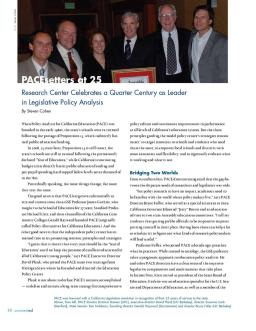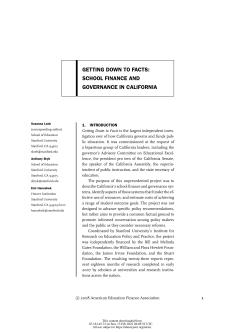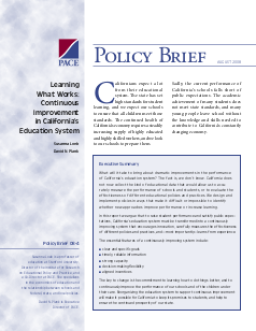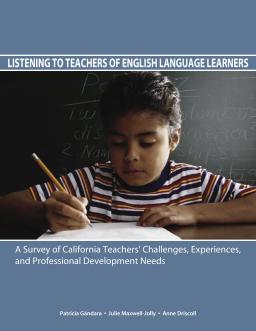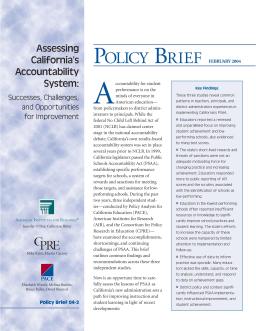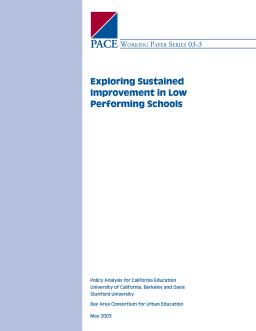A Strategy Guidebook for Leaders
Published
Summary
The Common Core presents challenges for school districts in teaching and learning. This guidebook provides evidence-based solutions to build teacher capacity, address curriculum gaps, design assessments, leverage technology, engage stakeholders, and manage change. It emphasizes the importance of design thinking, focusing on essential change management practices, and connecting the initiative to a broader vision for improved teaching and learning. The goal is to promote innovation, build reciprocal accountability, and effectively address both technical and human dimensions of change.
Published
Summary
The Common Core State Standards (CCSS) aim to improve public education by increasing expectations, deepening subjects, and providing an active curriculum. These goals include addressing disparities in U.S. student performance, reducing remediation rates, improving workplace readiness, and promoting civic participation. Equitable CCSS implementation can help close opportunity and achievement gaps affecting low-income, minority, and English learner students, with all standards expected of all students. California has a unique chance to improve education by implementing the CCSS effectively.
How High Schools Can Be Held Accountable for Developing Students' Career Readiness
Published
Summary
Preparing every high school graduate for postsecondary education and fulfilling work is the goal of common core standards. Career readiness and college readiness share many of the same skills, knowledge, and dispositions. Being ready for professional life requires additional transferable skills to support success throughout a lifetime of changing circumstances. The importance of transferable skills is emphasized by many groups and observers.
Published
Summary
The California Academic Performance Index (API) is limited by demographics, instability, and narrow focus on test scores. Experts recommend tracking individual students' progress, measuring achievement growth over multiple years, and using alternative performance measures. Improving API could enhance accountability systems and target educational improvements.
Five Years Later
Published
Summary
This report commemorates the fifth anniversary of the Getting Down to Facts project, which sought to provide a thorough and reliable analysis of the critical challenges facing California’s education system as the necessary basis for an informed discussion of policy changes aimed at improving the performance of California schools and students. The report focuses on the four key issues that received emphasis in the Getting Down to Facts studies: governance, finance, personnel, and data systems.
From Governance to Capacity Building
Published
Summary
Education reform efforts in Los Angeles and the US have failed due to the focus on governance and rules. The solution is to invest in capacity building, creating incentives and agency for students and teachers, easing adoption through regulatory relief, and financing those working on new learning models. The goal is to update the century-old model of learning, called Learning 1.0, with a new model, Learning 2.0, that builds an education system around the learning system. This approach is based on research into unconventional learning models.
Research Center Celebrates a Quarter Century as Leader in Legislative Policy Analysis
Published
Summary
The call for improved education persists annually within PACE, emphasizing the perpetual need for progress. Even with strides made, the organization does not consider its mission accomplished. Guided by three core principles—allocating resources to disadvantaged schools, granting autonomy to local districts, and rigorous evaluation of educational efficacy—PACE remains dedicated to fostering lasting policy reform and enhanced educational performance across California's system. Leveraging experience from Michigan State's Education Policy Center, PACE's leadership continues to drive the...
School Finance and Governance in California
Published
Summary
Getting Down to Facts is an extensive investigation of CA's public education system commissioned by a bipartisan group of CA leaders. The project aimed to describe California's school finance and governance systems, identify obstacles hindering resource utilization, and estimate costs to achieve student outcome goals. The project resulted in 23 reports by scholars, which highlight that the current school finance and governance systems fail to help students achieve state performance goals, particularly those from low-income families. The reports provide a framework for assessing reform options.
Continuous Improvement in California’s Education System
Published
Summary
This policy brief emphasizes the need for California's education system to become a continuously improving system that fosters innovation, measures the impact of policies and practices, and learns from experience. The authors identify key features of a continuously improving system, including clear goals, reliable data, change-supportive capacity, flexible decision-making, and aligned incentives. They explain how each of these features supports continuous improvement and highlight the differences between the current education system and a continuously improving one.
Data Systems and Policy Learning
Published
Summary
This report advocates for a continuous improvement approach to education in California, emphasizing the need for a comprehensive data system to inform decision-making and evaluation at all levels of the education system. It also recommends the use of research-based practices and the development of partnerships between schools and community organizations to support student success. The report emphasizes the importance of equity and suggests strategies for addressing achievement gaps and providing more resources to under-resourced schools.
A Survey of California Teachers’ Challenges, Experiences, and Professional Development Needs
Published
Summary
This report highlights the challenges faced by English learners in California schools and the need for better implementation of policies supporting them. The authors emphasize the importance of recognizing students' diverse linguistic and cultural backgrounds and providing them with meaningful opportunities to develop their skills. They also call for more research in language assessment and bilingual education. Overall, improving outcomes for English learners is crucial for promoting equity and social justice in California's schools.
Successes, Challenges, and Opportunities for Improvement
Published
Summary
California's accountability system, PSAA, has been examined by three independent studies, revealing five key issues. The system established specific performance targets, rewards, and sanctions for schools, but budget constraints and differences with NCLB require changes. The STAR testing and school assessment system needs review, and Governor Schwarzenegger proposed simplifying the school finance system. The brief aims to inform policymakers, clarify complex accountability issues, highlight educators' views, and outline four major implications.
Published
Summary
The No Child Left Behind Act of 2001 mandates all states to demonstrate “adequate yearly progress” towards state proficiency goals. This report explores how to measure sustained improvement in California public schools, and how demographic and school-level variables relate to student achievement. Annual Academic Performance Index scores alone do not indicate sustained improvement, so it is recommended to consider student progress over a longer time frame and all known variables that impact it.
